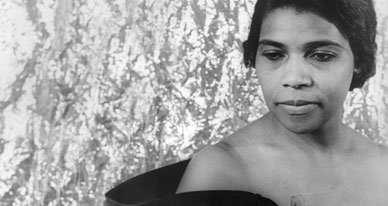production notes
the sea islands | twa terminal | marian anderson |
the hammerstein ballroom | gordon parks
Marian Anderson was born on February 27, 1897 in South Philadelphia. As a child, she discovered her love for singing, and became a member of the Union
Baptist Church Choir. As her voice matured into a beautiful contralto, she attempted to attend music school in 1917, but was turned away without even
an audition, because of her color. Refusing to be discouraged, she began a professional career in music, although in a small way, singing for benefits and
church socials.
Beginning in 1920, Anderson began touring, giving concerts at black colleges and churches. Touring also meant encountering Jim Crow laws that prevented
her from staying in hotels, sitting in good compartments on trains, and being served in many restaurants. In 1923 she won the Philharmonic Society of
Philadelphia's vocal contest, the first time an African-American had been awarded the prize. As a result, Anderson sang with the Philadelphia Orchestra
in a concert broadcast over radio, still a new technology.
She toured extensively in Europe, performing before King Gustav in Stockholm and King Christian in Copenhagen. Yet, when she returned to America, she
continued to face significant racism. For example, in 1937, Salt Lake City hotels refused her accommodations, in 1938, the Hotel Utah rented her a
room only after she agreed to ride up in the freight elevator. And in 1939, the Daughters of the American Revolution prevented her from performing at
Constitution Hall in Washington, D.C; instead, she sang at the Lincoln Monument in 1939 in a free concert before a black and white audience of 75,000.
In 1959, at the age of 57, well past her prime, she made her belated debut at Metropolitan Opera House as Ulrica in Verdi's Masked Ball. She was the
first black singer in the company's history.


